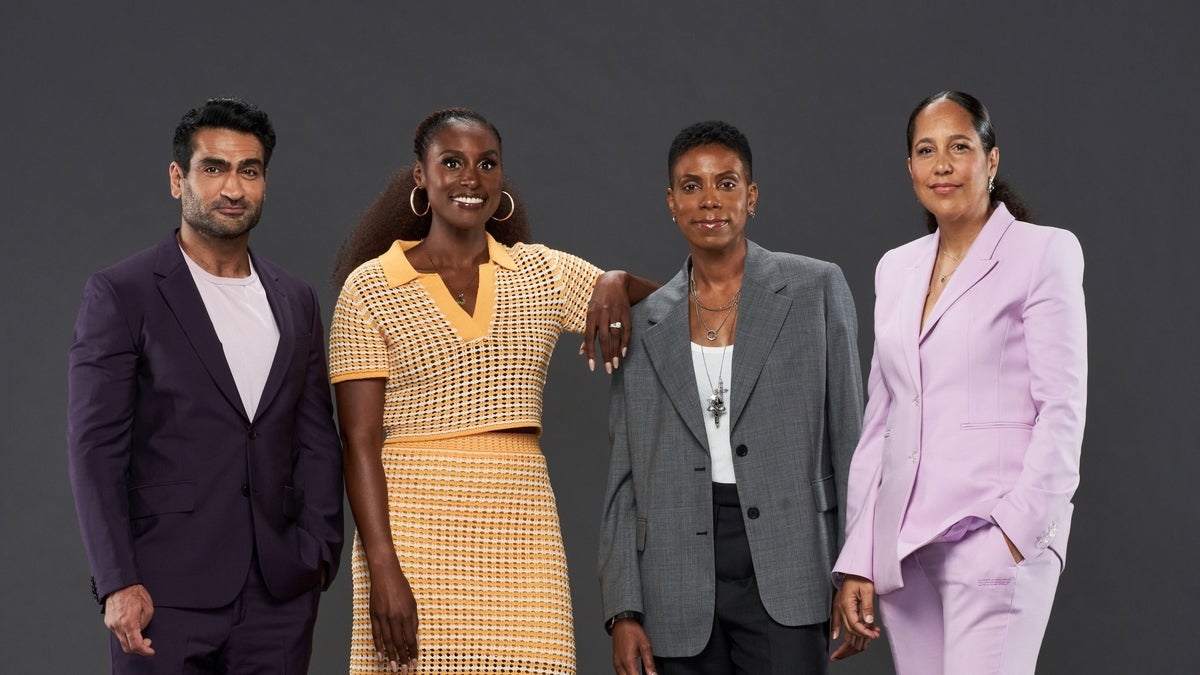
In Issa Rae’s reboot of “Project Greenlight,” filmmaker Meko Winbush was chosen to direct the film “Gray Matter,” which launched alongside the docuseries on Max July 13. In addition to producing through HooRae Media, Rae served as a mentor alongside actor Kumail Nanjiani and director Gina Prince-Bythewood. “Project Greenlight” previously aired on HBO from 2001-2005, and the mentors discussed how this newest iteration reflected 20 years of change in cinema.
Rae, Nanjiani and Prince-Bythewood sat down with TheWrap in an interview conducted before the SAG-AFTRA strike to dissect the structure of the show, particularly how having the finished film launch simultaneously would naturally drive audiences to see how it came together.
“I’m really curious about what the audience’s reaction is going to be to watching it,” Prince-Bythewood said. “I know there’s going to be some pretty strong opinions about it.”
Rae stands by the competition show format through with “Gray Matter” was produced.
“It’ll be interesting because it’s almost like a layered experience watching the movie,” Nanjiani added. “You’re not just watching the movie. You’re watching how it interacts with what you know of the making of the movie. So it’s, it’ll be fascinating.
Read more from the interview below:
Do you feel like the genre aspect of the film Meko had to make presented certain challenges, and at the same time, benefits for viewers to see inside the process?
Rae: As a producer, that was a learning lesson. I felt like we were really ambitious on our side to one, I think that finding a talented female filmmaker wasn’t a challenge at all, it’s more just having them produce something with a limited budget in a limited amount of time. That’s that’s just extremely challenging no matter what, and one of the things we’ve been discussing is obviously the script needed to be in the best shape. So rewriting the script awesome in that timeframe is super challenging.
Twofold, if I were to do again, I would make it a solid comedy or drama and make sure the script was super strong and then set the filmmaker on a main journey and that really is more about like how good of a director are you. How much of a visionary Are you? So yes the genre aspect was for sure a challenge.
Nanjiani: Sci-fi movies you think of are not made in 18 days, so you’re really having to, in some ways, do a deconstruction of a genre because you can’t afford to really go all out. You can’t make a “Star Wars” movie with this budget. So it is challenging, but I think that the writer did a good job of finding a very grounded way into a superhero movie.
If you three have another shot, what else do you feel like you learned during this season that you would take into the next, or at least advise if someone else were to pick it up and do it?
Prince-Bythewood: “When I used to watch ‘Project Greenlight’ it was just normal for all of the filmmakers and even the people up for it were all white men. I don’t even remember a person of color even being even up for it and the normalcy of that is kind of stunning to me. I’m so happy. that Issa and her team had this idea to reboot it and be reflective of what is going on now and where the industry absolutely needs to go. So I feel really good about being part of changing the narrative of who filmmakers are, what voices are worthy. To be able to do again, I’m confident that we would all continue in this vein and give shots to filmmakers that aren’t getting shots that should be getting shots.
Rae: I’m gonna be a little controversial. There’s some filmmakers that we that we met that I still think about daily and I wonder what it would look like if we chose [them] and if we had to make the same movie. Obviously, that’s like a budgetary Max conversation, but like I constantly think about what would it look like if LC made a movie as well with more comedic instincts or Nicole. There’s so many other filmmakers who are doing well and have these opportunities, but I just feel like there’s such a cruelty in even just choosing one, and that almost plays into the there’s only one slot for you women, so get it together. But I hope that especially with the ending episode we’re showing these other women are working and they’re still out there and they’re hireable. So I hope that exposure still lends itself to more opportunities for them as well.
Nanjiani: Choosing Meko was a very difficult decision, and it wasn’t based on talent. It was based on ‘Who was a good fit for this material? And the material is very specific. It’s a Lo-Fi sci-fi movie. As Lisa said, a lot of the other filmmakers are really really, really good. I’d love to work with them in any capacity doing something with a different tone.
The evaluation process to choose the director consists of a short film submission, and then the selected contestants each have to make a scene from the same script. Is that enough to judge a director’s ability and also to get exposure for the other directors that don’t get chosen?
Rae: I stand by [the competition structure]. Having them all create the same scene was probably the most exciting thing for me because you really get a chance to see — they don’t know anything about the script and this is purely [their] vision and how are you going to showcase the best of your abilities without also just throwing [in] everything including the kitchen sink. Some filmmakers kind of fell into that trap of just like I’m going to show them everything.
Nanjiani: Some of the filmmakers really tried to sort of show everything they could do, but that wasn’t the point of the exercise. The point of the exercise was to do this scene to trust the scene and to trust yourself to do the scene. They were all so talented, but the ones whose scene we felt we didn’t connect with were the ones who couldn’t focus down and find the core of the scene, the purpose of the scene, because they don’t have the full script, but you read that scene, you see what the emotion of it is, you see what’s going on. And the ones who sort of tried to show us their ability rather than just do the same were the ones that didn’t resonate as much.
Prince-Bythewood: It’s a strange thing to make creativity competitive. However, it was a pretty even playing field. They all got the same amount of money, same amount of time, same scene, and it really did elevate a number of folk to the top of our list and, and it really was what did they do with that scene? At the end of the day, we were all looking for the core of what you want as a filmmaker is to move people. Did you move us, and the top three, that’s what they had. It isn’t just about showing off your craft and skill and look what I can do, but did you make me feel and so that was a really fascinating exercise, and I think it’s a great way to you know, to structure this thing and choose a filmmaker, but it really came down to a top three that was really difficult to choose, so that’s what we have to do again.
“Project Greenlight” and “Gray Matter” are now available on Max.

















